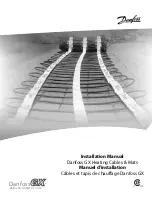
SAFETY INSTRUCTIONS
May 25, 2022
Page 8
User Manual No: OM-10
4
A EN
FALLING EQUIPMENT can injure
Use designated lifting device on power
source to lift the power source only, NOT
cart/running gear, gas cylinders, or any
other accessories
•
Use lifting equipment of adequate capacity to lift and support power
source.
•
If using lift forks to move power source, be sure forks are long
enough to extend beyond opposite side of power source.
•
Keep cables and Power Cords away from moving vehicles when
working from an aerial location.
•
Follow the guidelines in the
Applications Manual for the Revised
NIOSH Lifting Equation
[DHHS (NOISH) Publication No. 94
−
110]
when manually lifting heavy parts or Power Source.
1.03
Read Principal Safety Standards
Safety in Welding, Cutting, and Allied Processes, ANSI Standard Z49.1,
is available as a free download from the American Welding Society at
(Website: www.aws.org).
Safe Practices for the Preparation of Containers and Piping for Welding
and Cutting, American Welding Society Standard AWS F4.1, from
Global Engineering Documents (Website: www.global.ihs.com).
Safe Practices for Welding and Cutting Containers that have Held Com-
bustibles, American Welding Society Standard AWS A6.0, from Global
Engineering Documents (Website: www.global.ihs.com).
National Electrical Code, NFPA Standard 70, from National Fire Protec-
tion Association, Quincy, MA 02269 (Website: www.nfpa.org).
Safe Handling of Compressed Gases in Cylinders, CGA Pamphlet P-1,
from Compressed Gas Association, 14501 George Carter Way, Suite
103, Chantilly, VA 20151 (website: www.cganet. com).
Safety in Welding, Cutting, and Allied Processes, CSA Standard W117.2,
from Canadian Standards Association, Standards Sales, 5060 Spectrum
Way, Suite 100, Mississauga, Ontario, Canada L4W 5NS (Website:
www.csagroup.org).
Safe Practice for Occupational and Educational Eye and Face Protection,
ANSI Standard Z87.1, from American National Standards Institute, 25
West 43rd Street, New York, NY 10036 (Website: www.ansi.org).
Standard for Fire Prevention During Welding, Cutting, and Other Hot
Work, NFPA Standard 51B, from National Fire Protection Association,
Quincy, MA 02269 (Website: www.nfpa.org).
OSHA, Occupational Safety and Health Standards for General Industry,
Title 29, Code of Federal Regulations (CFR), Part 1910, Subpart Q, and
Part 1926, Subpart J, from U.S. Government Printing Office, Superin-
tendent of Documents, (Website: www.osha.gov).
Applications Manual for the Revised NIOSH Lifting Equation, The Na-
tional Institute for Occupational Safety and Health (NIOSH), 1600 Clifton
Rd, Atlanta, GA 30329-4027 (Website: www.cdc.gov/NIOSH).
1.04
California Proposition 65 Warnings
This product contains chemicals, including lead, or otherwise produces chemicals known to the State of California to cause
cancer, birth defects and other reproductive harm. Wash hands after handling. (California Health & Safety Code 25249.5 et
seq.)
Welding and cutting equipment produce fumes or gases which contain chemicals known to the State of California to cause
birth defects and, in some cases, cancer. Wear an approved air-supplied respirator for welding and cutting. (California Health
& Safety Code Section 25249.5 et seq.)
1.05
ELECTRIC and MAGNETIC FIELDS (EMF) Recommendations
Consult your doctor and the Implanted Medical Device manu-
facturer before going near arc welding, spot welding, gouging,
or plasma arc cutting.
EMF is produced around welding cables / accessories during
the welding operation and can interfere with some medical im-
plants such as pacemakers. All Welding Operators should use
the following procedures in order to minimize exposure to EMF
when welding.
•
Keep electrode / ground cables together by twisting or taping them
together.
•
Keep electrode / ground cables away from your body.
•
Do not place your body in between the electrode and ground cables.
•
Do not coil or drape cable around the body.
•
Keep Power source and accessories as far away from your body as
possible.
•
Do not weld whilst carrying the Power source or accessories.
•
Connect the ground clamp to the workpiece as close as possible to
the weld zone.








































